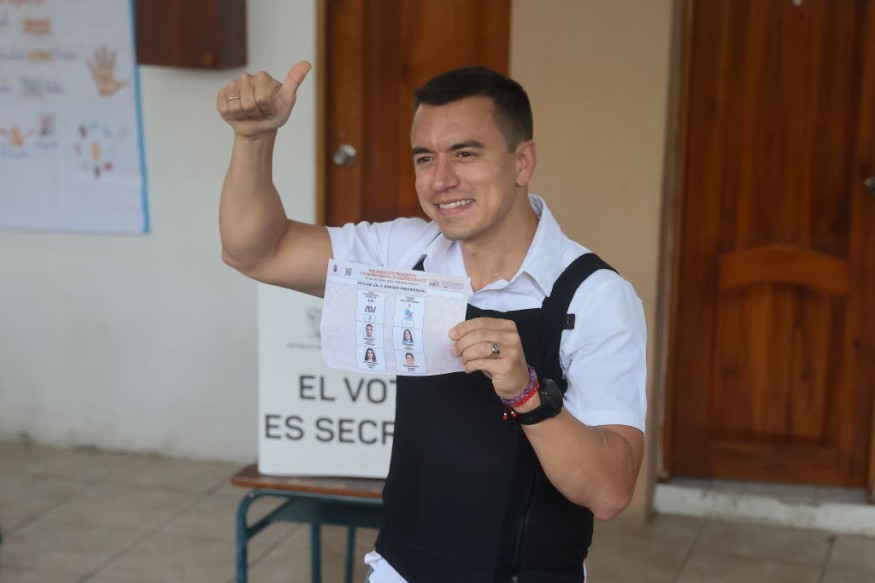Ecuador President Daniel Noboa Gets Support to Toughen Security Against Gang Violence

Ecuador's President, Daniel Noboa, achieved a significant victory in a recent referendum aimed at combating escalating violence attributed to criminal gangs.
The electorate overwhelmingly supported nine out of eleven proposed measures, predominantly focusing on bolstering security protocols, AP News reports.
These results underscore public backing for Noboa's administration and its war on crime efforts to address the surging violence, particularly in the wake of incidents such as the hostile takeover of a television station by masked gunmen.
Early Results Favor Noboa's Security Measures
Initial reports from Ecuador's referendum point towards a favorable reception of President Daniel Noboa's security strategies.
The National Electoral Council's data suggests strong support for nine out of the eleven propositions presented, notably endorsing key security initiatives.
Notably, the proposal to empower the military to collaborate with law enforcement in combating organized crime garnered significant approval, with 72% of early voters in favor, according to CNN.
Similarly, 65% expressed support for allowing extradition under specific conditions, a measure aimed at facilitating the prosecution of Ecuadorian nationals involved in criminal activities abroad.
However, two proposed measures - the introduction of hourly employment contracts and recognition of international arbitration for investment disputes - appear poised for rejection by the public.
Nonetheless, these initial results signal a triumph for Noboa, who assumed office with a pledge to tackle rampant criminality, which has marred Ecuador's reputation for tranquility.
READ NEXT : Ecuador Referendum Targets Crime at Polls
Arrest of Alleged Gang Leader and Context of Referendum
The referendum's context reflects Ecuador's transition from relative peace to grappling with the highest homicide rates in Latin America.
Notably, among the approved measures are provisions for longer prison terms and the extradition of violent offenders.
Nonetheless, human rights organizations have expressed apprehension regarding potential abuses stemming from these measures, BBC noted.
President Daniel Noboa called for the referendum amid a string of high-profile assassinations, including the targeted killing of a presidential candidate and several mayors.
The escalating gang violence, underscored by approximately 8,000 recorded violent deaths in 2023, prompted Noboa to declare a state of emergency and deploy military forces to confront criminal syndicates and restore order in the prison system.
While many voters perceive heightened military presence positively, citing improved street safety, others harbor reservations.
Carmen Elena Simbaña, whose brother fell victim to gang violence, voted against militarization, advocating instead for investments in youth development programs to address the root causes of crime.
Conversely, testimonies like that of "El Gato," a former drug dealer, shed light on the complex interplay between socioeconomic factors and criminality.
Despite acknowledging his own culpability, "El Gato" supports stringent security measures, emphasizing the pervasive influence of crime and drugs in inhibiting personal rehabilitation efforts.
Similarly, David Rodríguez, a victim of multiple kidnappings, echoes the call for enhanced security measures, emphasizing the urgent need for societal reprieve from prevalent criminal activities.
Ecuador's resounding endorsement of security measures in the recent referendum underscores the nation's collective resolve to address escalating gang violence attributed to criminal organizations.
While the outcome reflects widespread support for President Daniel Noboa's administration, concerns linger regarding potential human rights implications and the need for comprehensive strategies to tackle the underlying socioeconomic drivers of crime.
As Ecuador navigates this pivotal juncture, sustained efforts towards fostering community resilience and bolstering law enforcement capabilities will be imperative in fostering enduring peace and stability.
This article is owned by Latin Post.
Written by: Ross Key
WATCH: Ecuadoreans give nod to tightened security amid persisting gang violence - From Al Jazeera English
Subscribe to Latin Post!
Sign up for our free newsletter for the Latest coverage!

















